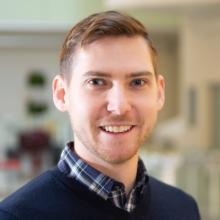Ryan Huff
Why did you decide to pursue a graduate degree?
I decided to pursue a graduate degree because I enjoy the challenge of developing methods and hypotheses for the purpose of answering unresolved questions. My long-term professional goal is to pursue a career in academic research focused on lung interventions and possible complications of these treatments. Specifically, I aim to further our understanding of both the immunology and pathophysiology of respiratory diseases. My interest in the immune system stems from investigating lymphoma genetics during my Master’s degree at the University of British Columbia in Medical Genetics. Moreover, due to my varsity athletics background, pollen allergies, and asthma, I was always particularly interested in the human airway and how it interacts with environmental exposures.
Why did you decide to study at UBC?
I decided to study at UBC because Dr. Carlsten’s Air Pollution Exposure Laboratory offered a unique opportunity that allowed me to further explore my research interests. His laboratory is one of few in the world and the only facility in Canada approved to perform controlled human exposures to diesel exhaust that mimic real-world situations. I am confident that my training at UBC will further develop my independent research, leadership, communication, and presentation skills, allowing me to grow into a dynamic and skilled scientist.
What is it specifically, that your program offers, that attracted you?
The Experimental Medicine program at UBC offers the latitude to explore health research questions that, by their very nature, are inter-disciplinary. This broader approach allows me to learn from and combine expertise from basic scientists and clinicians that specialize in an array of health science fields to learn more about how our environment influences the function of our respiratory system.
What was the best surprise about UBC or life in Vancouver?
Vancouver is an international city where I have had many opportunities to enjoy different kinds of food, music, and culture. In addition, as a long-distance runner and skier, Vancouver is a pretty exceptional place to live.
What do you see as your biggest challenge(s) in your future career?
The research landscape is slowly changing as more investigators compete for public grant funding. Finding ways to collaborate and build partnerships between academic labs and an emerging biotech industry in Vancouver will become increasingly more important to help drive research forward.
What aspects of your life or career before now have best prepared you for your UBC graduate program?
Following my MSc at UBC, I worked as a research technician and clinical coordinator for two and a half years. The combination of those two experiences provided me with invaluable perspective, resiliency, and research skills that I am continuing to improve upon in my PhD program. This path has not exactly been straightforward, and I would not have been able to navigate its challenges without the support of my wife, family, friends, and colleagues.
What advice do you have for new graduate students?
Be adaptable, there is no one path to success in graduate studies. Opportunities will often take you by surprise and in a different direction from what you had originally planned, and it is up to you to go after them. Also, take the time to make friends in your program and research group; collaborations often begin by discussing ideas over a beer.


